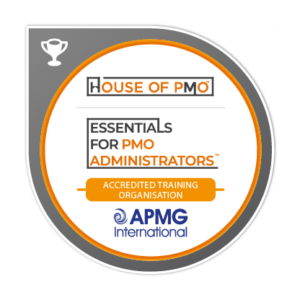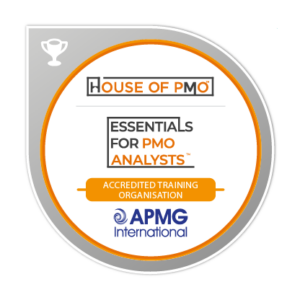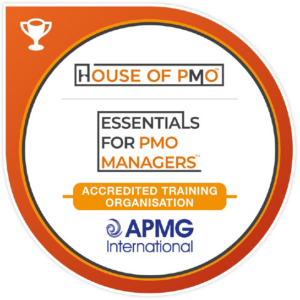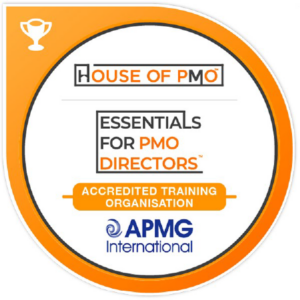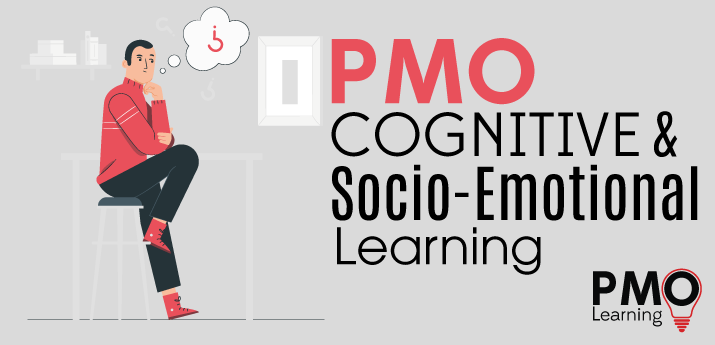
Cultivating a learning culture is not just a catch phrase or a luxury in these times. It is a way to protect your organization and its people. Courage matters as much as competence when, as we are all doing now, we have to take work virtual and we need to keep it human.
I love this final sentence in a recent article from the Harvard Business Review entitled, “Keep Your People Learning When You Go Virtual“*
The link for it was sent on by a client of PMO Learning as we work together to develop a virtual classroom course for their PMO team.
It’s widely acknowledged that there are two types of learning – cognitive and socio-emotional – and it’s finding the balance of the two that makes a great training course.
Cognitive and Socio-Emotional Learning
Cognitive is all about focusing on the imparting of knowledge and information – you’re in a classroom and the tutor is sharing a slide deck which has bullet points of information or a process diagram for example.
The socio-emotional side of learning is what we think about the knowledge we’re learning about and what others also think. You’re in a classroom and there’s a group discussion about how the process would work back in your place of work for example.
Learning about the knowledge (cognitive) is just as important as having the opportunity to talk about and discuss that newly found knowledge with others. We all know the saying, “Two heads are better than one”, having conversations and discussions with others as we learn also helps us form even more new knowledge, over and above that the tutor is teaching you about, all because you’re interacting with others on a course.
When you’re creating online learning, take eLearning for example, much of the focus of learning is on the cognitive side. Knowledge is provided by taking you through a set of modules, there is often information to read on-screen; videos to watch, quizzes to take part in and so on. This is all cognitive learning. You’re the single learner without any interaction with other learners to interact with.
Why Socio-Emotional Learning is Important
With a virtual classroom, planned and organised well, of course, the socio-emotional side can feature with a group of delegates taking part.
That’s the part that’s really important to us at PMO Learning.
We know that people learn more and information sticks when you have the opportunity to have those group discussions and interactions with others also learning alongside you.
Kolb’s Learning Model
You might already be familiar with Kolb’s Learning Model. In this model, Kolb states that effective learning takes place through a cycle of four different stages.
There is no one place to start – and all are equally important to enable effective learning, an “integrated process with each stage being mutually supportive of and feeding into the next.”**
With the courses, we develop and run at PMO Learning, we’re mindful of the balance between cognitive and socio-emotional learning AND the effective learning that takes place by course attendees with the stages of the learning model.
The Kolb Stages
- Reflective observation – Thinking about an experience and how you might do it better or differently next time.
- Abstract conceptualization – Understanding the theory and how it could be applied.
- Concrete experience – Experiencing something new or learning from others experiences.
- Active experimentation – Having a go at putting theory into practice.
Here’s how the learning model works in practice on our own courses:
- Reflective observation – the opportunity to reflect on what you’ve learnt from an in-class exercise – guided reflection with questions and support.
- Abstract conceptualization – learning about the theory of PMO practices and how they are applied in the workplace.
- Concrete experience – building roadmaps within the course that can be used back in the workplace, a solid outcome and piece of work is achieved from the course.
- Active experimentation – the opportunity to create assets and artefacts such as a process flow for a PMO service, with help from other learners in group exercises.
It’s important that learning carries on in times when it feels like training and development are the least of an organisation’s worries. Training often gets dismissed at this time yet we know that it will be the people within the organisation that are needed to adapt when changes are coming down the line. To adapt, we need new experiences, and new experiences mean new knowledge and information.
Not all learning and development transfer easily to a virtual environment – it takes more than just cognitive learning – learning delivered through a tutor or presenter imparting knowledge (think a one-way session like a webinar!).
True learning comes when we have the right blend of imparting knowledge and enabling learners to embed that knowledge through the interactions of others.
Our own client recognises that group learning with the PMO team members is very important to them right now – to be ready to adapt and change as we emerge from the COVID-19 pandemic – they’ll emerge more motivated, stronger as a unit, ready to tackle what comes their way.
*Read the article [ Keep Your People Learning When You Go Virtual ]
** Kolb’s Learning Cycle [ Kolb’s Learning Styles and Experiential Learning Cycle ]
Enjoying Our Blog?
Sign up and receive all our articles (we’ll send you an update once a week!) plus special offers and events:







